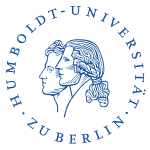University of Berlin
| Humboldt-Universität zu Berlin | |

|
|
| Motto | Universitas litterarum (Latin) |
|---|---|
|
Motto in English
|
The Entity of Sciences |
| Type | Public University |
| Established | 15 October 1811 |
| Budget | €424 million (excl. Charité) |
| President | Sabine Kunst |
|
Academic staff
|
2,441 |
|
Administrative staff
|
3,330 |
| Students | 32,996 |
| Undergraduates | 18,712 |
| Postgraduates | 10,881 |
| 2,951 | |
| Location | Berlin, Germany |
| Campus | Urban and Suburban |
| Nobel Laureates | 29 |
| Colors | blue and white |
| Nickname | HU Berlin |
| Affiliations |
German Universities Excellence Initiative UNICA U15 Atomium Culture EUA |
| Website | www |
The Humboldt University of Berlin (German: Humboldt-Universität zu Berlin, abbreviated HU Berlin) is one of Berlin's oldest universities, founded on 15 October 1811 as the University of Berlin (Universität zu Berlin) by the liberal Prussian educational reformer and linguist Wilhelm von Humboldt. The Humboldt university model has strongly influenced other European and Western universities.
From 1828 it was known as the Friedrich-Wilhelms-Universität, and later (unofficially) also as the Universität unter den Linden after its location in the former palace of Prince Henry of Prussia (1726–1802) which his brother, King Frederick II, had built for him between 1748 and 1753 on the avenue Unter den Linden.
In 1949, it changed its name to Humboldt-Universität in honour of both its founder Wilhelm and his brother, geographer Alexander von Humboldt. In 2012, the Humboldt University of Berlin was one of eleven German universities to win in the German Universities Excellence Initiative, a national competition for universities organized by the German Federal Government. The university has been associated with 40 Nobel Prize winners and is considered one of the best universities in Europe as well as one of the most prestigious universities in the world for arts and humanities.
The first semester at the newly founded Berlin university occurred in 1810 with 256 students and 52 lecturers in faculties of law, medicine, theology and philosophy under rector Theodor Schmalz. The university has been home to many of Germany's greatest thinkers of the past two centuries, among them the subjective idealist philosopher Johann Gottlieb Fichte, the theologian Friedrich Schleiermacher, the absolute idealist philosopher G.W.F. Hegel, the Romantic legal theorist Friedrich Carl von Savigny, the pessimist philosopher Arthur Schopenhauer, the objective idealist philosopher Friedrich Schelling, cultural critic Walter Benjamin, and famous physicists Albert Einstein and Max Planck.
...
Wikipedia
